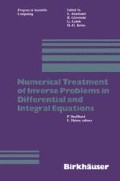Abstract
When the function evaluation in parameter estimation by error norm minimization or in a range of related optimization problems involves the numerical solution of differential equations, the smoothness of that solution with respect to parameter changes is critical to the behavior of the minimization code (which might be trying to estimate partial derivatives numerically). If fixed stepsize, fixed order methods are used for integration, it is easy to see that the integrands have the desired smoothness, but such methods are not always efficient or even possible. Modern automatic integrators have very poor smoothness properties-some-times not even continuous. If the solution of y′ = f(y, t, p), y(0) =y0(p) is denoted by y(t, p) where p is a parameter, and the numerical solution from a code using tolerance ε is y(t, p;ε), we hope that
In a “smooth“ method we also want
In practice, the second term is computed numerically. If the integrator is not smooth, we are forced to use ε= 0(δS(Δp)S) which can be very expensive. In this paper we examine methods for which the above inequality can hold with = 5. Preliminary experiments with Runge-Kutta like codes show some promise.
Access this chapter
Tax calculation will be finalised at checkout
Purchases are for personal use only
Preview
Unable to display preview. Download preview PDF.
References
Gear, C.W., Runge-Kutta starters for multistep methods, ACM TOMS 6(3), September 1980, 263–279.
Vu, Thu V., Modified Runge-Kutta methods for solving odes, Dept.Rpt. UIUCDCS-R-81-1069, Dept. Computer Sci., Univ. Illinois, 1981.
Editor information
Editors and Affiliations
Rights and permissions
Copyright information
© 1983 Birkhäuser Boston
About this chapter
Cite this chapter
Gear, C.W., Vu, T. (1983). Smooth Numerical Solutions of Ordinary Differential Equations. In: Deuflhard, P., Hairer, E. (eds) Numerical Treatment of Inverse Problems in Differential and Integral Equations. Progress in Scientific Computing, vol 2. Birkhäuser Boston. https://doi.org/10.1007/978-1-4684-7324-7_1
Download citation
DOI: https://doi.org/10.1007/978-1-4684-7324-7_1
Publisher Name: Birkhäuser Boston
Print ISBN: 978-0-8176-3125-3
Online ISBN: 978-1-4684-7324-7
eBook Packages: Springer Book Archive

